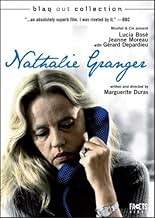Aggiungi una trama nella tua linguaThis art film has no conventional dialog between the main characters. This tells a strangely compelling story of two women in a suburban home who are listening to radio news broadcasts about... Leggi tuttoThis art film has no conventional dialog between the main characters. This tells a strangely compelling story of two women in a suburban home who are listening to radio news broadcasts about a missing child in their area.This art film has no conventional dialog between the main characters. This tells a strangely compelling story of two women in a suburban home who are listening to radio news broadcasts about a missing child in their area.
Recensioni in evidenza
Elliptical . . you are invited to project into the gaps. I find an atmosphere of unbearable tension, depression, grief, apprehension,
watching two women living with some persistent post-traumatic stigma, unexplained, in a waiting that never ends. Something to do with the mother's unique, uncommunicable anguish over a very bad, violent, abnormal daughter. We never learn what she did or see her misbehave, we imagine the worst and her most innocent behavior seems unnerving, suggestive of evil. A double anguish, also having to do with a pair of depraved teenage boy killers on the loose in the neighborhood. Did they kill someone in the family? Or are they perhaps family members? Do the two women know something about these boys that the police don't? A numbed mood with its own rapturous nuances, separates them from the street world in front of the house, and the equally claustrophobic garden world in back of the house, the absolutely still house. Great actresses are denied the opportunity to act, a kind of negative violence which causes amazement and discomfort. By bizarre contrast, suddenly a radiant 24 year-old Depardieu, as an awkward vacuum cleaner salesman, gives a hilarious, virtuosic shaggy dog monologue out of Pinter or Beckett. Virtually his first film, it precedes his official filmography; what a discovery. The film goes nowhere, a fragment, a shard of smoky Durassian flint. The more Duras one already knows, the more one can appreciate this seemingly obscure and tedious film.
watching two women living with some persistent post-traumatic stigma, unexplained, in a waiting that never ends. Something to do with the mother's unique, uncommunicable anguish over a very bad, violent, abnormal daughter. We never learn what she did or see her misbehave, we imagine the worst and her most innocent behavior seems unnerving, suggestive of evil. A double anguish, also having to do with a pair of depraved teenage boy killers on the loose in the neighborhood. Did they kill someone in the family? Or are they perhaps family members? Do the two women know something about these boys that the police don't? A numbed mood with its own rapturous nuances, separates them from the street world in front of the house, and the equally claustrophobic garden world in back of the house, the absolutely still house. Great actresses are denied the opportunity to act, a kind of negative violence which causes amazement and discomfort. By bizarre contrast, suddenly a radiant 24 year-old Depardieu, as an awkward vacuum cleaner salesman, gives a hilarious, virtuosic shaggy dog monologue out of Pinter or Beckett. Virtually his first film, it precedes his official filmography; what a discovery. The film goes nowhere, a fragment, a shard of smoky Durassian flint. The more Duras one already knows, the more one can appreciate this seemingly obscure and tedious film.
Two of the four reviews on this site say in essence, "I'm a fan of minimalist cinema but this is too minimalist." Well, I'm not a fan of minimalist cinema. I wanted to see this movie because Duras wrote Hiroshima Mon Amour, one of the greatest movies of all time, but within twelve minutes I had a very bad feeling. You hear a news report, two women exchange a few words, one makes a phone call, then they clean the kitchen table, slowly and thoroughly, then they go into the kitchen and clean up their, and one makes another phone call, and I'm thinking, is this really the movie? So then I read the four reviews here, two dismissive, two ecstatic (but suggesting that this is a movie where the viewer has to fill in the gaps) and I decided that life is short and 12 minutes of this movie is quite enough.
10sleepsev
Though I don't know anything about French social contexts during the 1960's and 1970's, though I haven't read any of Duras' works, though I can't figure out what is the message behind this movie, I still feel "Nathalie Granger" is one of the most beautiful films ever made. The beauty of "Nathalie Granger" doesn't come from its visual quality nor the objects it depicts, but from its serenity and the way things are represented. I have to quote the phrase "makes my heart cave in" from "American Beauty" to describe my feeling for this movie, because that's what I really feel, and the feeling I get from "Nathalie Granger" is in a way similar to the feeling I get from the dancing plastic bag scene in "American Beauty,"though "Nathalie Granger" is not didactic at all. As for me who don't understand any symbols hidden in "Nathalie Granger," the great sense of enjoyment I get from this movie comes from its sublimation of simple things and of domestic chores. Duras makes me look at simple things again in such amazement, such wonder, such astonishment of how beautiful they actually are.For me, the table cleaning scene is one of the greatest scenes in cinematic history. Though I might have seen people clearing tables a thousand times in my life, I still feel I have never seen anything like this scene before. Duras can capture the beauty and the charm of simple things into her film, and by representing them like something we have never seen before, she also captures the hearts of the audience. Another thing that impresses me a lot is the performance of Lucia Bose, especially in the scene with Gerard Depardieu. I like the expression on her face very much when she listens to the salesman. The radio broadcast about murderers at large is another thing that I like. There are also many other extraordinarily beautiful and calm scenes in this movie: the tearing up of paper, the piano playing, the characters' walking, the things that they do with leaves, and the shots of a baby carriage. I describe only my feelings here, not the meaning of this movie, because a few books have already deciphered it. Though I'm aware that the feeling I get might not be what Duras intended, I still feel very grateful for her for opening my eyes to see a wonderful kind of beauty, and for giving me a rare and precious sense of "nonconforming serenity."
not enough lines, but full of cinematic words. i can say it's a dictionary of cinematic words. it's silent but eloquence. real an intelligence. if you can't understand those words, you can' understand what Duras wanted to say. you know that's a loss of your life. blond hair-black hair, light color clothes-dark color clothes.... what do you think of that? maybe it's just a whim of the director. water-mirror. you can look in the water what reflects. do you recognize him or her? what if, you don't know someone reflects in water instead of you? what you gonna do? deny or affirm? is it really someone you don't know? listen to the radio. it's interesting. Polanski once use this method in Knife in the water. i witness in this film, that Duras moved by the several works of great Antonioni.
Lo sapevi?
- ConnessioniFeatured in Les lieux de Marguerite Duras (1976)
I più visti
Accedi per valutare e creare un elenco di titoli salvati per ottenere consigli personalizzati
Dettagli
- Tempo di esecuzione1 ora 23 minuti
- Colore
- Mix di suoni
- Proporzioni
- 1.66 : 1
Contribuisci a questa pagina
Suggerisci una modifica o aggiungi i contenuti mancanti

Divario superiore
By what name was Nathalie Granger (1972) officially released in Canada in English?
Rispondi























